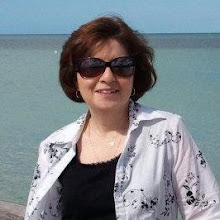Daddy Dearest
I admit it, I was a daddy's girl. I couldn't wait until my dad got home from work each day, and would swing me up in his arms and twirl me around until I was dizzy with delight. Even when I was little bitty, I recognized that the way his face lit up when he caught sight of me racing down the sidewalk to meet him meant that I was his "most special person." And as I got older, that same face would beam with pride at my piano recitals, enjoying every minute of each one, from the three line, one fingered pieces, all the way through to Beethoven Sonatas and Debussy's Arabesque. From the earliest of ages, I was always certain of one thing, and that was my father's love and acceptance.
That was why his betrayal hurt me so deeply. Technically, it was my mother he betrayed, but the ramifications of his actions affected me at my deepest core. Even though I was a grown woman with a family of my own, the things he did meant I could no longer count on him to be there for me, as guardian, protector, constant admirer. I built up a huge core of anger and resentment toward him, feelings that no amount of therapy or pharmaceuticals seemed to erase. We were completely estranged for several years.
I did a lot of reading and talking about forgiveness, from the Christian standpoint and the psychotherapeutical standpoint. I visualized my anger and hurt feelings being tossed from a cliff, submerged in the waves, burned to ashes. But I could always manage to rekindle those embers of rage, and for a long time I held on to them so tightly becuase the anger was the only power I had over the pain he had caused me.
In his wonderful novel The Grace That Keeps This World, author Tom Bailey writes:
"Forgiveness didn't arrive as a thought. You could talk about the idea of forgiveness, of course, talk it out, reason with yourself, but that wasn't the mystery of forgiveness. An emotion first, it happened in the heart, not the head. And you had to be prepared to receive it - there were no short cuts to the full knowledge of it."
That's exactly how it happened for me. One day I realized that thinking about my dad no longer made me white hot with anger, no longer made me want to scream about his unfairness and injustice. Forgiveness appeared as a surprise, unbidden, arriving in my heart like a long hoped for guest. I welcomed it with open arms.
Today, I'm having lunch with my dad and his wife. We laugh and talk fairly easily together, now. I am not the little girl that runs to meet him with such great joy, but meeting him brings me a measure of peace. In the end, forgiveness was a gift to both of us.
That was why his betrayal hurt me so deeply. Technically, it was my mother he betrayed, but the ramifications of his actions affected me at my deepest core. Even though I was a grown woman with a family of my own, the things he did meant I could no longer count on him to be there for me, as guardian, protector, constant admirer. I built up a huge core of anger and resentment toward him, feelings that no amount of therapy or pharmaceuticals seemed to erase. We were completely estranged for several years.
I did a lot of reading and talking about forgiveness, from the Christian standpoint and the psychotherapeutical standpoint. I visualized my anger and hurt feelings being tossed from a cliff, submerged in the waves, burned to ashes. But I could always manage to rekindle those embers of rage, and for a long time I held on to them so tightly becuase the anger was the only power I had over the pain he had caused me.
In his wonderful novel The Grace That Keeps This World, author Tom Bailey writes:
"Forgiveness didn't arrive as a thought. You could talk about the idea of forgiveness, of course, talk it out, reason with yourself, but that wasn't the mystery of forgiveness. An emotion first, it happened in the heart, not the head. And you had to be prepared to receive it - there were no short cuts to the full knowledge of it."
That's exactly how it happened for me. One day I realized that thinking about my dad no longer made me white hot with anger, no longer made me want to scream about his unfairness and injustice. Forgiveness appeared as a surprise, unbidden, arriving in my heart like a long hoped for guest. I welcomed it with open arms.
Today, I'm having lunch with my dad and his wife. We laugh and talk fairly easily together, now. I am not the little girl that runs to meet him with such great joy, but meeting him brings me a measure of peace. In the end, forgiveness was a gift to both of us.





1 Comments:
Thank you for this. I struggle to forgive both my parents for betrayals. Forgiveness is a terribly complex process. My father now has Alzheimers, but hasn't forgotten that he doesn't want to see or speak to me. Maybe he'll forget that part soon, maybe I'll find something in my heart to offer then.
Post a Comment
<< Home